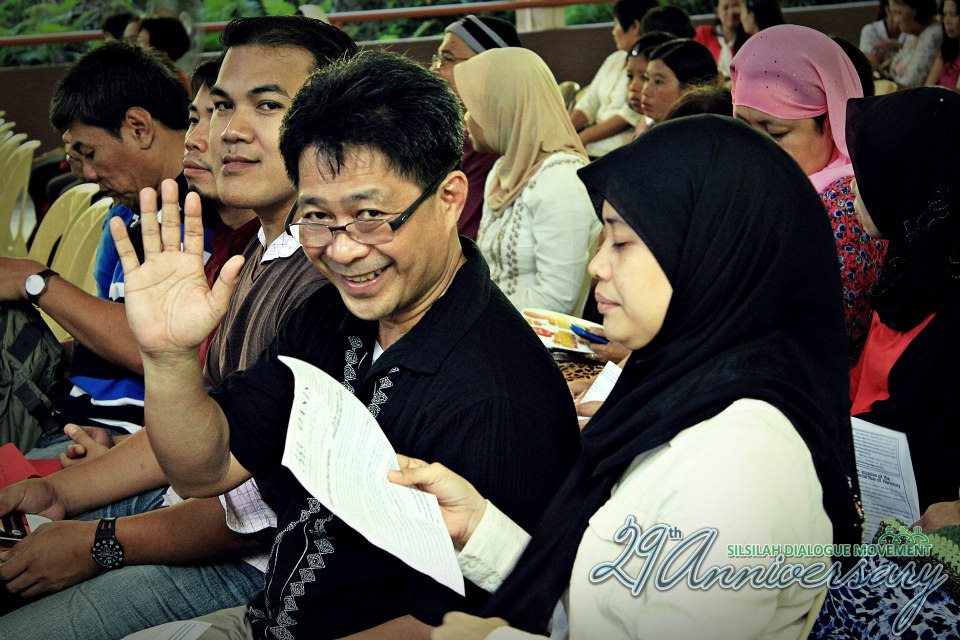“With Silsilah, I am convinced that life-in-dialogue is possible. It continues to happen without us even noticing it. I am aware that the process of dialogue and letting go of my prejudices against people who are different from me will continue to happen. It does not matter how long it will take. What is important for me is that in the process, personal transformation has been happening in my life.”
I started my involvement with the Silsilah Dialogue Movement in the year 1999. At that time, I was the Novice Master of the Society of Mary (Marist Fathers, as we are known), Philippine District. I was given the responsibility to accompany our students who were preparing to become Marist priests. I then asked myself, “What are the other things we can consider to integrate into the Marist formation process?” Our students were coming from Mindanao, and eventually they would certainly be working in the Philippines when they get ordained. And besides, we are an international congregation, and they could be assigned anywhere around the globe.
Mindanao is composed of people from diverse cultures, religions, and traditions. Beyond Mindanao and the Philippines, the diversity is far more immense. Seeing this reality, I’ve been convinced that Marists have to be formed in the atmosphere of interreligious and intercultural dialogue. I was attracted to the spirituality of Silsilah because it creatively highlights our relationships with God, Self, Others and Creation. Without hesitation, I attended the summer courses. For the first time, I was given the space to relate closely with our Muslim brothers and sisters. I experienced eating with them together.
We conversed and shared our experiences, perceptions, and even prejudices. This experience was further deepened in my time with our Muslim foster parents. Looking back, this rich and precious experience which Silsilah had provided me in the past 18 years has inspired me to continue my commitment to dialogue. With Silsilah, I am convinced that life in dialogue is possible. It continues to happen without us even noticing it. Bearing all the learnings I had from Silsilah, this conviction has been strengthened along the years. One good and unforgettable story I always fondly reminisce is my experience during the summer of 2012. It was at this time that I decided to visit Jolo, one of the havens of the infamous terrorist group, Abu Sayaff. While I was still planning for the visit, my companions especially those who were already involved in interreligious dialogue, discouraged me from going. “It’s too dangerous and risky. Please do not go Larry” they said. Perhaps I was hard-headed. Despite all the warnings, I pursued my plan and found myself taking the night ferry boat trip from Zamboamga City to Jolo with a Muslim friend. His name is Datu Yldon Kiram. Dats, as he is fondly called by friends, is a public school teacher. While this friend of mine was very glad to accompany me, he was highly cautious to instruct me not to speak a single word so that people would not notice that I’m not Tausug (name of the native tribe of Jolo). I obediently followed. All I did though was to smile and nod around. Nevertheless, I felt relaxed and comfortable throughout the trip. I slept very well on the collapsible bed. When we arrived at 4:30 a.m. the next day, Dats told me he was taking me to the parish convent. “No Dats, I am going with you wherever you go,” I replied. He was surely surprised and insisted on his first plan. I didn’t give up insisting so he gave up and allowed me to go home to his family. The reason that kept me from the idea of staying at the parish convent was the high possibility that I would not be able to go out from the parish grounds without a body guard. That appeared more dangerous to me! I enjoyed my time in Jolo. I was grateful for the hospitality and generosity of my Muslim friend Dats and his family. I didn’t feel any fear throughout my stay in that place. I trusted Dats when he said he would look after me and protect me from any harm. It was indeed a beautiful experience of friendship and interreligious dialogue.
After a few months, I heard from people that Dats had been sharing the experience of being trusted by a priest. He could not just believe that a Catholic priest had trusted him. When Dats came to Davao City for a visit, he stayed with us in our Marist community. Our friendship deepened ,and we continued to share our experience of lights and shadows in our work of interreligious dialogue.
This beautiful experience of trust with a Muslim friend was only possible because of the culture of dialogue and harmony that I’ve learned from the Silsilah Dialogue Movement. I am aware that the process of dialogue and letting go of my prejudice against people who are different from me will continue to happen. It does not matter how long it will take. What is important for me is that in the process, personal transformation has been happening in my life. Now I am in a new mission in Thailand and Myanmar and I continue to believe that dialogue is possible in spite of the difficult situation of different cultures and religions that I am facing here. Yes, “It’s possible! It’s happening now!”
Fr. Hermes “Larry” B. Sabud, SM
Silsilah Alumni

